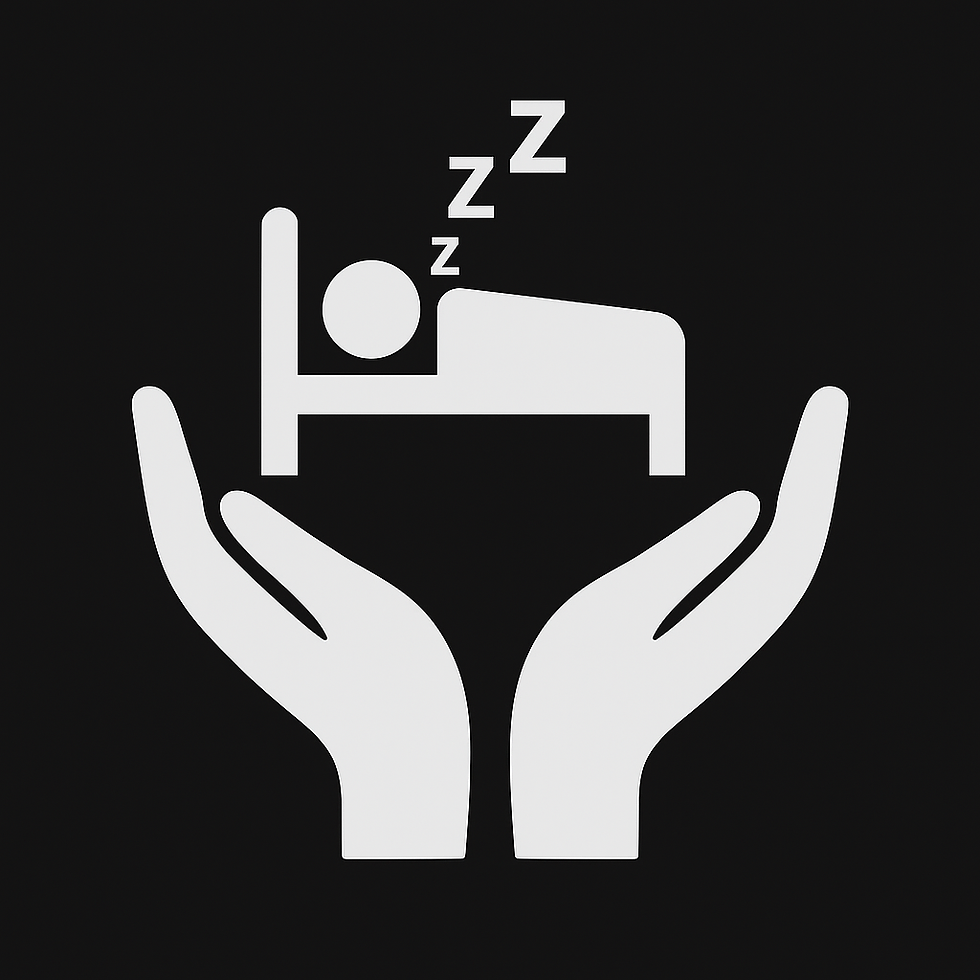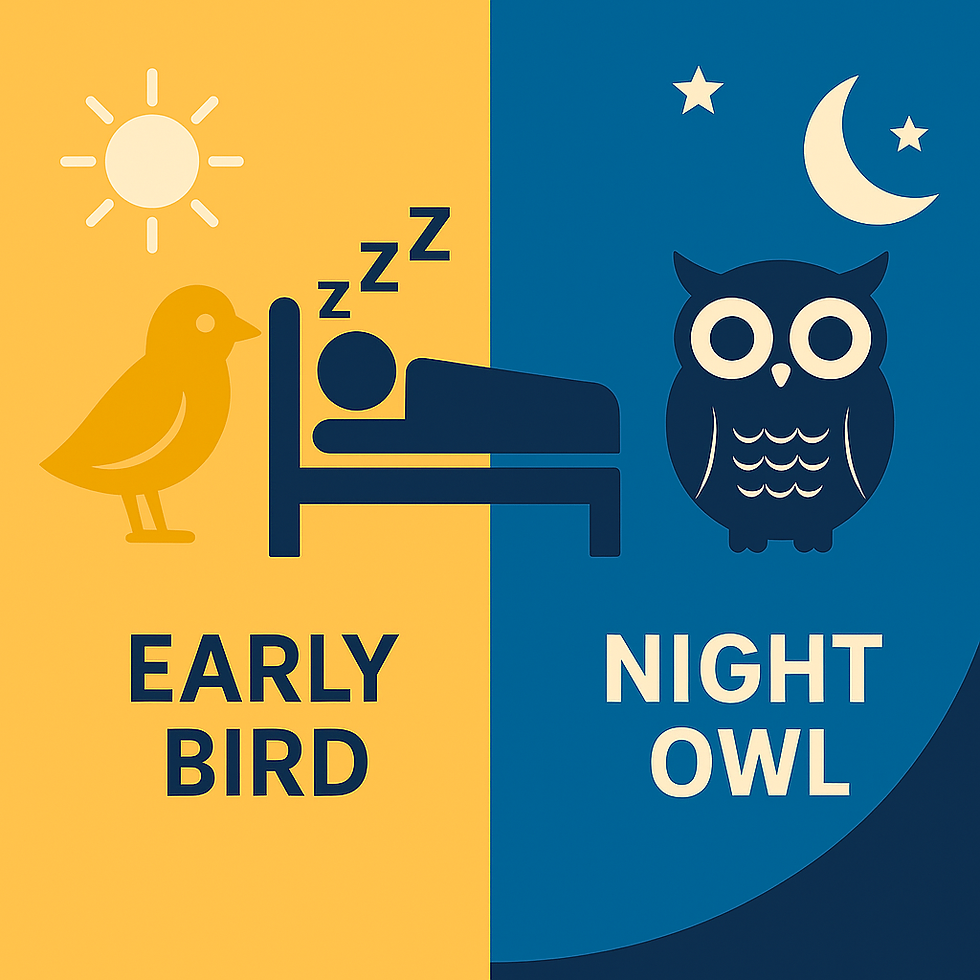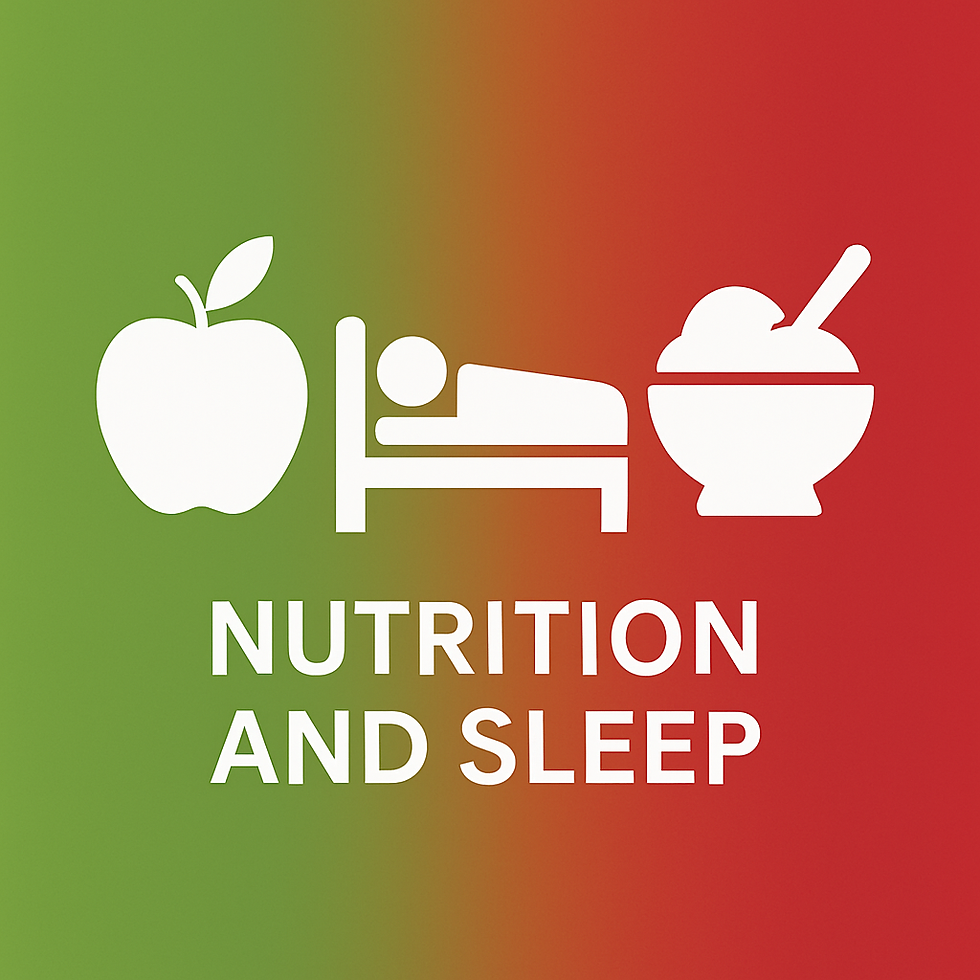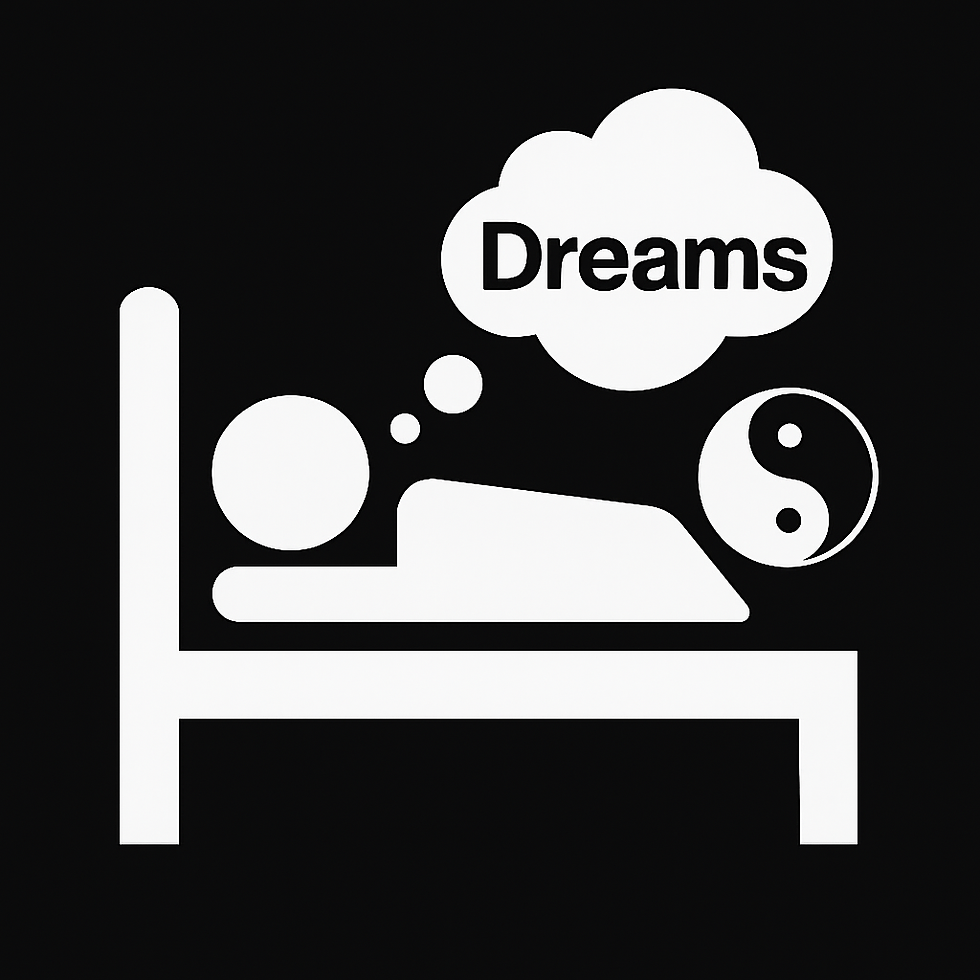Sleep: The Quiet Foundation of Resilience.
- David Yates

- Jun 30, 2025
- 10 min read
Updated: Jul 10, 2025
In a world that rarely stops moving, sleep can feel like the one thing we cannot afford. Yet it is the one thing we cannot afford to lose.

Resilience and Sleep: A Quiet Invitation.
Resilience is about expanding your capacity to meet life’s challenges without constant overflow.
In this series, we explore how to adapt, recover and renew within a demanding world.
Today, we turn to the quiet foundation that underpins every domain of resilience.. sleep.
Why Rest is an Act of Strength and the Beginning of Clearer Living.
Sleep is not a luxury or a weakness, it is the quiet foundation that supports how we think, feel and live. It renews our minds, steadies our emotions and rebuilds our bodies.
It is not lost time.. it is recovery and renewal.
It is the pause that allows us to rise again, clear-eyed and calm, ready for the day we are living.
The Active Work of Sleep.
It is easy to imagine sleep as a passive state, a nightly disappearance from the world, but beneath the stillness, sleep is an active, intricate orchestration of renewal.
As we sleep, our brains prune and strengthen connections, filing memories and clearing away the clutter of the day. Our muscles repair, hormones rebalance and the immune system prepares to defend us against tomorrow’s challenges.
Dr Matthew Walker calls sleep “the greatest legal performance-enhancing drug.”
It does not make us superhuman, but it restores us to what we are meant to be.
Yet, despite its quiet power, nearly one in three adults consistently fall short of sufficient sleep, leading to frayed patience, dulled thinking and a body that carries fatigue like a hidden weight.

The Architecture of Sleep: Cycles of Restoration.
Sleep is not a single uniform state but a series of cycles, each lasting about 90 to 110 minutes, unfolding in gentle waves through the night. Each cycle carries us through stages of light sleep, deep sleep and REM (rapid eye movement) sleep, each with its own role in building resilience.
Light sleep is the doorway, where breathing slows and muscles relax. Deep sleep, often called slow-wave sleep, is where the body repairs itself, fortifying the immune system and sweeping away metabolic waste from the brain.
This deep sleep is most abundant in the first half of the night, grounding us in physical restoration.
REM sleep, rich with dreams and vivid images, is where the mind turns experiences into memory, emotions into understanding and thoughts into creative insights. REM sleep dominates the second half of the night, helping us wake with clearer minds and steadier hearts.
It is in this gentle sequencing that sleep restores us fully, which is why most adults require seven to nine hours each night, not as a marker of indulgence, but as a biological necessity that underpins clarity, calm and health.
The Subtle Power of Naps.
There are seasons in life when sleep at night is not enough, or when the weight of the day calls for a gentle pause.
Naps can offer this pause, replenishing focus and stabilising mood.
Short naps of 10 to 20 minutes can refresh without entering deeper sleep, helping you wake clear-headed. A longer nap of around 90 minutes allows the body to complete a full cycle, supporting memory, learning and creativity.
Naps greater than 45minutes can leave you with a temporary grogginess, known as sleep inertia, if you wake from deep sleep.. but even this passes, leaving you better equipped to meet the day.
Napping wisely is not a mark of laziness but an act of self-respect, especially during times of high demand, learning, or new parenthood.

Sleep: Where Learning Becomes Knowing.
There is a reason why problems can look different in the morning. Sleep is the quiet workshop where the brain consolidates what we have learned, linking new information with what we already know and weaving facts into memory.
Research shows that sleep stabilises learning and supports problem-solving, making it an integral part of study and professional development.
For students preparing for exams, for professionals facing complex challenges, for anyone striving to hold new knowledge in a fast-moving world, sleep is not wasted time.
It is the final step in learning, where effort becomes understanding.
Sleep and the Four Domains of Resilience.
Daniel Amens Four Domains of Resilience, biological, psychological, social and spiritual are each strengthened through sleep.
Biologically, sleep supports immune function, tissue repair and hormonal balance. Psychologically, it calms the mind, reducing reactivity and sharpening focus.
Socially, a well-rested mind meets others with patience and warmth. Spiritually, sleep offers the space where reflection and alignment with purpose can quietly unfold.
In this way, sleep is not a compartment of health but a thread that weaves through every part of a balanced life.

The Rhythm Within: Circadian Patterns and Chronotypes.
We each carry a natural rhythm that shapes our days and nights, known as the circadian rhythm. This internal clock is guided by light, temperature and habit, influencing our alertness, energy and mood.
For some, energy rises with dawn, tapering gently into evening. For others, the mind sharpens as daylight fades.
Knowing your natural patterns, whether you are an early bird or a night owl, can help you align your most demanding work with your peaks in focus, while honouring your need for rest when the body calls for it.
Morning light anchors this rhythm, helping to stabilise sleep timing, while dimmed lights in the evening gently signal the mind and body that rest is near.
Sleep and Emotional Steadiness.
A lack of sleep often makes the world feel sharper, heavier and harder to navigate. Small frustrations become larger, worries feel closer and patience runs thin.
Research shows that sleep deprivation increases emotional reactivity, while sufficient rest helps the brain process and integrate emotions, making challenges feel more manageable.
REM sleep in particular supports emotional regulation, providing a quiet space where the mind can soften the edges of strong feelings, allowing us to approach life’s challenges with steadiness and clarity.
Stories from the Everyday: A Student, A Parent, A Pilot.
Madeline, in her first year of university, found that late-night study sessions left her mind cluttered and tired. One night, she chose to close her books and sleep and in the morning, the clarity she needed had arrived.
Matt, a new parent, learned to “sleep when baby sleeps,” embracing short naps in the rare quiet moments, helping him meet the demands of caring for his newborn with patience.
David, a long-haul pilot, came to understand that protecting his sleep during layovers was as vital as technical skill, keeping his mind sharp and his judgment clear.
Sleep did not remove their challenges, but it gave them the clarity and calm needed to meet those challenges well.

Nutrition’s Role in Sleep.
What and when we eat quietly shapes how we sleep.
Magnesium-rich foods such as nuts and leafy greens can aid relaxation, while tryptophan-rich foods like dairy and turkey support the production of serotonin and melatonin, hormones that guide the body toward sleep.
High sugar intake can cause spikes and crashes in blood sugar, disturbing rest and while hydration is important, too much fluid close to bedtime may lead to night-time awakenings.
Heavy meals close to bedtime can lead to discomfort, while going to bed too hungry can also disturb sleep.
A light, balanced meal in the evening, not too close to bedtime, can support restful sleep.
Caffeine, Alcohol and Timing.
Caffeine, found in coffee, tea and chocolate, blocks the brain’s sleepiness signals and can linger in the body for six to eight hours. Limiting caffeine after mid-afternoon can protect sleep.
Alcohol may help you fall asleep more quickly, but it disrupts the deeper stages of sleep and REM, fragmenting rest and reducing its restorative quality.

Creating a Sleep-Supportive Environment.
Your sleep environment is the quiet frame that holds your rest.
Darkness supports the production of melatonin, the hormone that signals your body it is time to sleep, while a cool room around 18–20°C aligns with the body’s natural drop in temperature at night.
White noise or nature sounds can mask disruptive noises, while a comfortable mattress and breathable bedding reduce discomfort that might wake you.
Limiting screen use in the hour before bed or using warm light filters can protect the mind’s transition toward rest.
Tracking Sleep: Useful Tool or Hidden Stress?
Wearables and apps can increase awareness of sleep patterns, helping some people spot habits that need adjustment.
However, for others, tracking can become another pressure, with data causing stress when it does not match perceived effort.
If you use trackers, treat them as guides rather than judgments, prioritising how rested you feel each day.

Dreams, Reflection and Inner Clarity.
Dreams are not distractions but part of the mind’s quiet work of integration.
During REM sleep, the brain revisits emotional experiences in a calmer, low-adrenaline environment, a process researchers often call “overnight therapy.”
It is during this time that memories are sifted and sorted, emotions are softened and patterns are gently pieced together, helping us to wake with clearer minds and lighter hearts.
Dreaming serves as the mind’s way of creating narrative coherence, turning what feels chaotic into something we can hold and understand.
Studies have shown that dreaming about difficult or stressful events can reduce their emotional charge in waking life, allowing us to face challenges with steadiness rather than being overwhelmed by them.
In this sense, dreams protect us from crises during the day by quietly processing what we could not fully make sense of while awake.
Some dreams bring flashes of insight, connecting ideas we could not see in the daylight. Others ease the weight of worries we carry, helping us feel less burdened by what lies ahead.
Some spark creative solutions, giving us fresh perspectives on problems that once felt immovable.
In this way, dreaming is a natural expression of balance, the yin of sleep to the yang of our waking hours, where reflection meets action and where sleep becomes a place of gentle repair not just for the body but for the spirit.
Dreams remind us that even while we rest, a quiet part of us is at work, weaving together the story of who we are and who we are becoming.
Sleep, Immunity and Health.
Sleep is one of the body’s quiet protectors.
Research shows that adequate sleep strengthens immune function, supports recovery from illness and improves the effectiveness of some medications/vaccines.
Chronic sleep deprivation, on the other hand, increases the risk of infections and slows healing.

Gender and Life Stage Considerations.
Pregnancy:
Hormonal changes and physical discomfort can disrupt sleep. Side-sleeping, supportive pillows, and naps may help during this season.
Perimenopause and Menopause:
Hot flushes, night sweats and shifting hormones often affect sleep. Cooling the room, wearing breathable clothing and relaxation techniques may ease restlessness.
Older Adulthood:
Sleep may become lighter, with more frequent awakenings, but the body’s need for rest remains. Consistent routines and light exposure can help maintain quality sleep.
When Sleep meets Chronic Conditions.
Chronic pain, anxiety and depression can all influence sleep patterns, making rest more elusive.
Pain can interrupt sleep with discomfort, while anxiety often keeps the mind busy long after the day has ended. Depression can shift sleep patterns in either direction, leading to early waking, difficulty falling asleep, or sleeping longer without feeling restored.
Maintaining consistent routines, pacing activity during the day and gently anchoring morning and evening rhythms can support the body’s ability to find rest, even during challenging seasons.
Working with healthcare providers to manage underlying conditions is also an important step, recognising that sleep and health often walk hand in hand.
Taking Small Steps Towards Better Sleep.
If you are noticing your sleep is disrupted during a season of stress, anxiety, or low mood, it can be easy to feel pressure to fix it all at once.
But sleep, like building resilience, often responds best to small, steady and incremental changes.
You might start by choosing just one action from this article:
Going to bed at the same time each night.
Stepping outside for morning light.
Setting aside ten minutes to breathe or journal before bed.
Adjusting your room to be cooler and quieter.
Gently reducing caffeine in the afternoon.
Even these small anchors can signal safety to your mind and body, gradually supporting your ability to rest.
Improvement may come slowly, but consistency is powerful. Notice what helps and let it become part of your rhythm before adding the next gentle change.
If sleep challenges continue and begin to affect your daily life, know that seeking help from a GP or a qualified professional is a wise next step.
Sleep is not just a health metric, it is a quiet partner in your ability to live, think and care for yourself and others.

When to Seek Help.
If sleep challenges persist despite healthy routines, such as difficulty falling asleep, staying asleep, or daytime exhaustion, seeking professional support is wise and often very useful.
Persistent snoring with daytime sleepiness may indicate sleep apnoea, while ongoing insomnia may benefit from structured interventions like Cognitive Behavioural Therapy for Insomnia (CBT-I), which has shown long-term effectiveness without the side effects of medication.
Challenging the Cultural Narrative: Sleep is Not Weakness.
In many workplaces and cultures, sleep deprivation is quietly celebrated as proof of commitment. Yet the evidence is clear: sleep deprivation impairs decision-making, memory and emotional stability.
A culture that values rest is a culture that values clear thinking, creativity and compassion.
Common Myths About Sleep.
“I can train myself to need less sleep.” Chronic restriction reduces cognitive and emotional capacity, even if we feel used to it.
“Everyone needs exactly eight hours.” Needs vary, but seven to nine hours is optimal for most adults.
“Older adults need less sleep.” They may sleep less, but their need remains similar.
“Waking at night is always a problem.” Brief awakenings are normal; it is the ability to return to sleep that matters.
“Alcohol helps with good sleep.” It disrupts deeper sleep and REM.

Your Sleep Toolkit:
Keep a consistent sleep schedule.
Get morning light, dim lights in the evening.
Create a calming wind-down routine.
Limit screens before bed.
Keep your bedroom cool, dark and quiet.
Use your bed for sleep.. save, scrolling, television and work for other areas.
Limit caffeine in the afternoon.
Moderate alcohol, particularly in the evening.
Eat a light evening meal.
Nap wisely if needed.
Reflect or journal to calm the mind before bed.
Seek help if persistent issues remain.
Closing Thoughts.
Sleep is the quiet ally we carry with us, the tide that washes away the debris of the day, the gentle steward of our minds and bodies.
It does not promise to remove life’s challenges, but it equips us to meet them with clarity, steadiness and hope.
In a world that often urges us to push past our limits, sleep reminds us that restoration is not weakness but wisdom.
Each night offers the chance to care for ourselves with quiet dignity, preparing us to rise and meet the day we are living.
Why not self care your mind and body tonight and try one new habit for a long and restful sleep.
Sleep well 🙏🏻




Comments